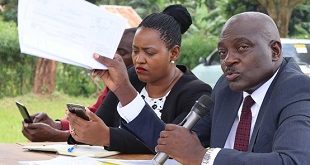
President’s 30-year grip shaken as party primaries throw up new leaders
President Yoweri Museveni is weaker. No he is stronger. Those are the contrasting views from the recent NRM party primaries and National Conference. And Museveni was out to make a statement about it when on Nov.1 he sprinted to the podium to accept his nomination as the party flagbearer during the National Conference. The 71-year old has been unwell, with his right hand in plaster. But his slightly leaner frame and the energetic sprint should have dampened speculation surrounding his fitness for the grueling race ahead.
The `Museveni is weak’ side, in reality, was pointing at how big names of the party and incumbents were defeated in the primaries for flag-bearers for district and parliamentary seats. The losses could have continued at the National Conference during elections to fill some party executive positions but Museveni intervened quickly. The move also revealed part of his strategy for the 2016 elections.
Top on the list of losers is Gen. Kahinda Otafiire, an abrasive bush war comrade of President Museveni who has been in parliament for three decades. He is reported to have said that even if he offered his coat to contest in his Ruhinda Constituency, the voters would elect it.
In the primaries, Otafiire was defeated by a little known local called Capt. Dononzio Kahonda. Otafiire’s loss was doubly humiliating because, at the time of the election, Kahonda was in prison.
Voters were reportedly fascinated by Kahonda’s name which loosely translates as “the pounder” and at rallies sang about how Kahonda should “pound Otafiire”. In the end, Kahonda got 21,467 votes against Otafiire’s 12,949.
By the time he arrived at Namboole Stadium for the National Conference, Otafiire was a deflated figure. His ambition to rise even higher in the party by contesting for the coveted party Vice Chairman for western region was dead and little attention was paid to his withdrawing in favour of another bush-war comrade and lame-duck party leader, Maj. Gen. Matayo Kyaligonza. It was the second time Kyaligonza’s dying political life was being resuscitated. President Museveni rescued him first in the primaries, when he asked his son-in-law, Odrek Rwabogo not to run against him.
Another NRM top gun whose loss signified a major shift in the party was Edward Francis Babu, the former powerful vice president for Kampala. Babu was vying for the same post again. But he was a dejected figure when he arrived at the National Conference after losing the Kampala City mayoral primaries to one Daniel Kazibwe, a musician and businessman with no previous political record. He soon fell out of the race. Babu’s loss was a double blow to Museveni following his wife, Nantongo Zziwa, being booted out of the speakership of the East African Legislative Assembly over incompetence. Zziwa also contested for the Kampala district woman MPs slot and lost in what could be the political end of this once powerful family.
The only vice president race that was squarely won is the northern slot where the Minister for Disaster Preparedness Hillary Onek defied Museveni and run against the Minister of State for Housing, Sam Engola. Onek lost.
Another one who defied Museveni is Godfrey Nyakaana who insisted on running against the powerful former treasurer of the party, Singh Katongole for the party vice chairman for Kampala district. Nyakaana won.
Critics say Otafiire’s loss and that of his peers is a sign that voters are tired of long-serving incumbents; that the wave for change has the momentum and could in 2016 throw up the unexpected for Museveni who is capping 30 years in power. They point at the enthusiasm surrounding the candidature of former Prime Minister Amama Mbabazi, who was the NRM secretary general and Museveni’s consigliore.
Museveni’s strategy
Fortunately for Museveni, he had ring-fenced his position as the sole candidate for party flag-bearer. Still, he arrived at the National Conference, looking very much like a commander who top-guns were being taken out. He spent long hours plotting to save them.
In the end, Museveni retained five out of the six old guard party regional vice presidents. The regional vice presidents are critical for Museveni, especially in the 2016 elections. As he told the delegates at Nambole, Museveni’s strategy involves ensuring the party is united going into the election. He also said the party needs the young to work with the old.
Critically, although Museveni usually relies on informal structures outside the party – including his trusted relatives, friends, and cadres – to run his election campaigns, the regional vice presidents are crucial.
Unfortunately this time, as he goes into the election in 2016, Museveni will be sitting in the party’s politburo, the Central Executive Committee, with only 11 of the 22 people he started off with after the last election in 2011. It could have been worse if he had not rescued the four vice presidents, among them Alhaji Abdul Nadduli who pulled out of the election of the Luweero District chairmanship he held. Nadduli’s failure to hold Luweero was deeply emotive for both Nadduli and Museveni as this was ground zero of the five-year bush war that brought Museveni to power and Naduuli was among the top civilian mobilisers for the war effort. To seal its talisman-like position, Museveni always starts his campaigns in Luweero. But the halo of the war is fading.
Museveni, Nadduli, Kyaligonza, and Gen. Jim Muhwezi are now the only surviving bush war fighters in the powerful NRM party CEC. Jim Muhwezi suffered a glancing blow when his wife, Susan Muhwezi failed to secure the chair for the NRM Women’s League. Although Susan had installed herself as the de facto leader when Jacqueline Mbabazi’s leadership floundered following the fall-out between her husband, former Prime Minister Amama Mbabazi and Museveni, the chair was snatched by Lydia Wanyoto. Another Museveni camp insider, the controversial businessman Hassan Basajabalaba is also out of the CEC.
Despite the glaring losses, the `Museveni is strong’ side insist, the losses are an opportunity for Museveni and the party.
They say a review of the new comers easily shows that the primaries might have improved prospects for Museveni’s quest to muster more control on the party and by extension parliament.
Since the inception of the multiparty dispensation, Museveni has thrived on using the ruling party’s majority to circumvent parliament by doing most of its business in the NRM parliamentary caucus. The decisions are then presented to parliament to be rubber-stamped. That has made Museveni’s grip on the NRM MPs critical.
 The Independent Uganda: You get the Truth we Pay the Price
The Independent Uganda: You get the Truth we Pay the Price


